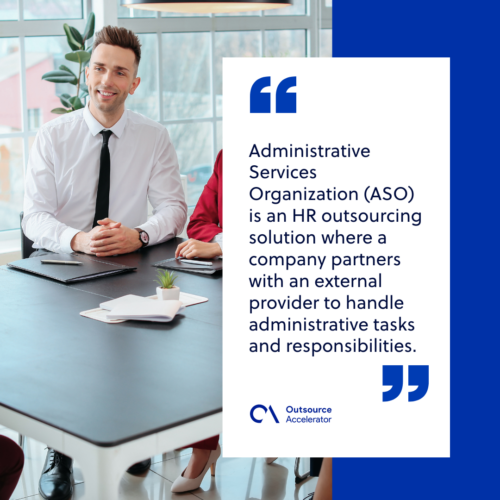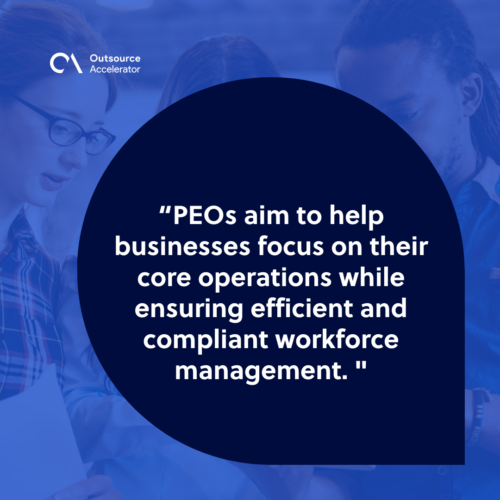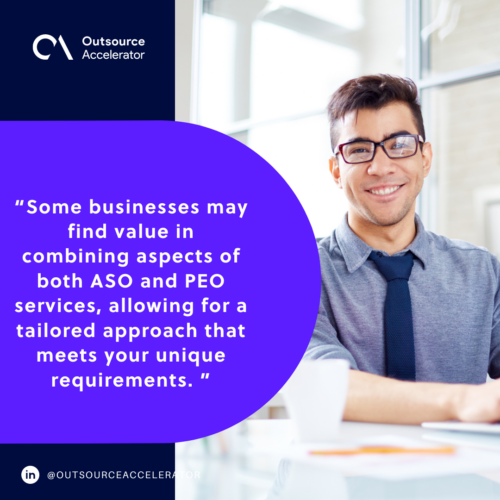ASO vs. PEO: Differences explained

Companies constantly seek ways to streamline operations and maximize their workforce’s potential.
Two popular options that often come up are the Administrative Services Organization (ASO) and the Professional Employer Organization (PEO).
While both services offer valuable support, their structures, responsibilities, and impacts on businesses diverge significantly.
This article aims to unravel ASO vs. PEO. We’ll explain how these two approaches contrast in their characteristics and advantages.
By the end, we hope your organization has learned how to strategically leverage each to meet your needs and goals.
What is ASO?
Administrative Services Organization (ASO) is an HR outsourcing solution where a company partners with an external provider to handle administrative tasks and responsibilities.
These services are designed to streamline and enhance various aspects of employment management.
ASO tasks typically include:
- Payroll processing
- Tax filing
- Employee benefits administration
- Recruiting and onboarding support
- Compliance with employment laws
ASO services offer companies the flexibility to offload time-consuming HR tasks and focus on their core business functions.
At the same time, businesses maintain a great deal of autonomy in overall workforce management.

What is PEO?
Professional Employer Organization (PEO) is also an HR outsourcing solution.
In this arrangement, the PEO becomes the employer of record for the client’s employees, assuming responsibility for HR functions.
The client company maintains control over the day-to-day activities and management of its workforce, but the PEO handles the back-office operations.
This co-employment relationship allows the PEO to share certain employer liabilities and risks with the client. By doing so, PEOs aim to help businesses focus on their core operations while ensuring efficient and compliant workforce management.

ASO vs. PEO: Key differences
The devil is in the details when it comes to differentiating between ASO vs. PEO. But it’s through understanding their key differences that companies optimize their HR functions.
Here’s an overview of the primary differences between the two:
Employment relationship
In an ASO arrangement, the client company retains the employer of record status. It controls essential employment decisions, such as hiring or firing. The ASO company offers a range of à la carte HR services.
Conversely, a PEO establishes a co-employment relationship with the client, sharing employer responsibilities. The PEO assumes a more integrated role, becoming jointly responsible for important back-office decisions.
HR responsibilities
An ASO primarily focuses on handling specific administrative tasks such as payroll processing, tax filing, and employee benefits administration.
A PEO takes on a more comprehensive approach, providing a wide range of HR services that include:
- Payroll
- Benefits administration
- HR consulting
- Compliance assistance
- Risk management
- Employee training
Legal structure
Within an ASO arrangement, the client company retains the legal liability for employment-related issues. ASOs maintain a more arms-length relationship.
On the other hand, the PEO assumes shared legal liability for employment-related matters. This means that both the client company and the PEO are responsible for mitigating legal risks and ensuring compliance with employment laws.
The legal distinction offered by PEOs can have implications for issues such as workers’ compensation and liability.
Benefits administration
With an ASO, the client company typically negotiates and selects its employee benefits options independently. The ASO assists with plan management but does not typically co-sponsor employee benefit plans.
The co-employment model of PEOs offers more competitive benefits packages, including health insurance, retirement plans, and other perks.
Control and flexibility
An ASO is a suitable option for companies that want to retain full control over their HR operations while outsourcing specific tasks. It offers scalability as the services can be tailored to the client’s evolving needs.
PEOs provide a more hands-on approach, which may limit the client’s control. However, this model is more suited for rapid scaling, allowing businesses to focus on expansion without being burdened by administrative tasks.
Cost structure
ASO services are typically fee-based, charging a flat monthly fee or based on the volume of services provided. The cost structure is often transparent, with clients paying for the services they use.
PEO services typically charge a bundled fee that covers a comprehensive set of services. While this may lead to higher costs, it also provides access to additional benefits and expertise.
ASO vs. PEO: Which should you choose?
Deciding between an ASO and a PEO depends on your business’s unique needs and circumstances.
Here are some of our suggestions to guide your decision-making process:
Choose ASO if:
- Autonomy is a priority – ASOs act more as consultants, allowing you to selectively outsource specific HR functions while retaining autonomy in crucial matters.
- Customization is essential – If your business requires a tailored approach where you can choose and customize the specific HR functions you want to outsource, an ASO may be the preferable option.
- Risk management needs to be controlled – If your company is well-equipped to manage its own risks and liabilities, ASOs provide a structure where you retain primary responsibility for compliance and legal matters.
Choose PEO if:
- Integrated HR solutions are preferred – Opt for a PEO if you seek a more integrated and comprehensive solution that offers a broader spectrum of HR functions.
- Economies of scale matter – PEOs often pool from multiple client companies, providing access to a wider range of benefits at potentially more favorable rates.
- Risk sharing is a priority – PEOs absorb a significant portion of the employer’s liability, particularly in areas like taxes, workers’ compensation, and regulatory compliance.
Consider both if:
- Hybrid solutions are desirable – Some businesses may find value in combining aspects of both ASO and PEO services, allowing for a tailored approach that meets your unique requirements.
- Cost structures align – Carefully assess cost structures and evaluate which model aligns better with your budget and the services you truly need.

The decision to choose between ASO vs. PEO is a nuanced one.
Conduct a thorough analysis of your business requirements, and if necessary, seek professional advice to ensure your chosen model aligns seamlessly with your goals.







 Independent
Independent




